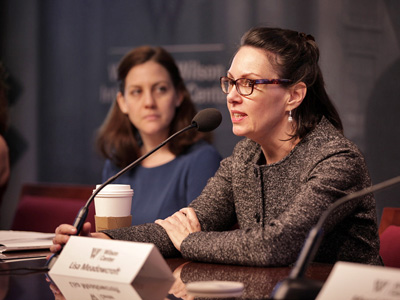-
Lisa Meadowcroft on Integrating Water and Sanitation With Maternal Health Goals in Kenya
May 9, 2014 By Donald Borenstein
In sub-Saharan Africa, women collectively spend an estimated 40 billion hours a year gathering water, often walking miles to the nearest source, which may not be clean, and braving exhaustion, harassment, and worse along the way. Water availability and quality at health clinics is often not much better, creating a crisis for women, especially pregnant women, throughout the continent. A mutual solution lies in better coordination between efforts to improve water, sanitation, and hygiene (WASH) and maternal health, says the African Medical and Research Foundation’s Lisa Meadowcroft in this week’s podcast.
In sub-Saharan Africa, women collectively spend an estimated 40 billion hours a year gathering water, often walking miles to the nearest source, which may not be clean, and braving exhaustion, harassment, and worse along the way. Water availability and quality at health clinics is often not much better, creating a crisis for women, especially pregnant women, throughout the continent. A mutual solution lies in better coordination between efforts to improve water, sanitation, and hygiene (WASH) and maternal health, says the African Medical and Research Foundation’s Lisa Meadowcroft in this week’s podcast.
“Every person should have between about 50 and 100 liters a day – for drinking, for washing, for cooking, etc.,” says Meadowcroft. “We in the U.S. use about 575 liters a day, and on the continent of Africa, a family which consists usually of about four to six people uses about 20 a day.”
Women were delivering at home because the nearest health facility was at least 10 kilometers away and had no access to clean waterLack of access to clean water has resulted in a crisis for expectant mothers in Kenya, where rainfall has declined and become more erratic. The African Medical and Research Foundation (AMREF), working in the Kitui West and Mutito constituencies in conjunction with USAID, found 85 percent of women were delivering at home because the nearest health facility was at least 10 kilometers away and had no access to clean water, Meadowcroft says. Women were sometimes even asked to bring their own water to the clinic.
On top of that, “women in these rural villages and urban slums don’t have time to start businesses, which further exacerbates poverty in their communities,” Meadowcroft says. And young girls miss out on school, both because they have to help with water collection but also because bathroom facilities are frequently shared with boys. “Once they start menstruation, if there aren’t separate latrines for boys and girls, girls drop out of school dramatically.”
In response, AMREF has initiated community-based programs in Kitui West and Mutito, improving the WASH facilities at five local health clinics; building new water tanks, latrines, and hand-washing stations; and also training women on how to install new wells. Sixty-five percent of the funding for these projects comes from AMREF, while the other 35 percent comes from the community, not necessarily in capital but through labor and upkeep in kind, Meadowcroft says.
“Kitui is a very male-dominated culture,” she says, and when AMREF initially started its training program, there was significant backlash. “On any given day the poverty level is such that you earn about a dollar and a quarter,” she says. “These women are earning $100 a month from doing this.” Ten years after the program began, however, other communities are now reaching out to those women to help build wells elsewhere.
“We want to strengthen further the linkages between water and sanitation and maternal and child health,” Meadowcroft said. “We want to invest in innovative water conservation systems, and we need to get more men involved.”
Lisa Meadowcroft spoke at the Wilson Center on March 10. Download her slides to follow along.
Friday podcasts are also available for download on iTunes.
Sources: UN Development Program.
 A Publication of the Stimson Center.
A Publication of the Stimson Center.



